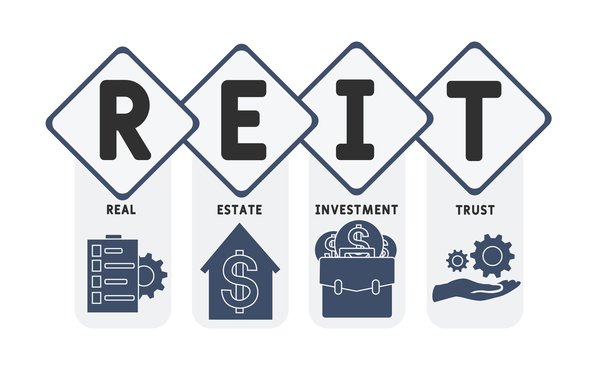
Real Estate Investment Trusts, or REITs, are known for their dividends. The average dividend yield for equity REITs is right around 4.3%. However, there are some high-dividend REITs out there that pay significantly more than average.
The dividend yield on a REIT is based on its current stock price. That means that even if a REIT pays a really high dividend, it won't be a good return on your investment if the price drops significantly.
It's important to look at more than a REIT's yield when investing for dividend income. You'll want to look at metrics that will give you more insight into how healthy a REIT is and how likely it is to provide you with a nice annual dividend each year.
You want to make sure the dividend yield isn't too good to be true when investing in a high-dividend REIT. There are a few red flags to look for that may point to some trouble on the horizon.
- Over-leveraged. A REIT may be paying high dividends because they're using too much leverage to acquire their properties. They are quite vulnerable to any dips in the real estate market or spikes in vacancy if their real estate investment portfolio is overleveraged.
- High payout ratio. REITs are able to pay high dividends because they're required to pay 90% of their taxable income to shareholders. However, that taxable income doesn't include tax deductions like depreciation. That gives them some room to keep cash on hand. A high-dividend REIT might be paying so well because they have a high payout ratio. The problem with this is that they aren't left with much liquid capital to handle unexpected rough patches. A REIT with a more conservative payout ratio is likely to have more cash on hand to acquire more real estate and have a safety net if the real estate market takes a hit.
- Declining revenue. This is a major red flag for any type of investment. A bad quarter can be easily overlooked. A steady decline in earnings is usually something to stay away from. They may be invested in struggling areas or property types that are losing demand, which would hurt their rental income. They may also be selling properties to pay off debt, which would also result in less rental income.
Three best high-dividend REITs to buy right now
As we wrap up what is most likely the most significant earnings season in recent history, we’re getting a clear picture of which REITs are positioned to thrive as the world recovers from the pandemic. Three high-dividend REITs that have stood out are Medical Properties Trust (MPW 1.66%), Iron Mountain (IRM 1.36%), and VICI Properties (VICI 0.95%). Here's a look at each.
| SYMBOL | DIVIDEND RATE (QUARTERLY) | DIVIDEND YIELD |
|---|---|---|
| (NYSE:MPW) | $0.29 | 8.60% |
| (NYSE:IRM) | $0.62 | 4.75% |
| (NYSE:VICI) | $0.39 | 4.70% |
1. Medical Properties Trust
This healthcare REIT has a growing portfolio of hospitals across the United States, Europe, Australia, and Columbia. In fact, it's the second-largest owner of hospital beds in the United States.
Medical Properties Trust has over 50 operators that lease their hospital properties on a triple net lease, and over 90% of these are on a master lease. This leasing model limits the REIT’s property-level expenses, since the tenants bear the costs of maintenance, taxes, and insurance and provides stability with multiple properties being tied to each operator’s lease.
While 2020 was a difficult year for most healthcare REITs due to the pandemic, it was a big year for Medical Properties Trust. The company completed nearly $3.4 billion in acquisitions and saw a 46% increase in revenue from 2019. Considering that it didn’t start collecting rent on many of its acquisitions until the fourth quarter of 2020, it should see even more revenue growth in 2021.
The company announced a 4% dividend increase in February 2020, continuing its eight-year streak of annual increases. The FFO payout ratio decreased from 82% to 78% since its last increase. Between the increase in its dividend coverage and expected revenue growth, it’s likely we’ll see its streak of increasing payouts continue.
2. Iron Mountain
Iron Mountain is quite unique compared to most other REITs. The information management company was historically considered a service provider as opposed to a real estate company, until the Internal Revenue Service (IRS) agreed to classify the steel racking structures it uses for document storage as real estate. This private-letter ruling from the IRS allowed Iron Mountain to convert to a REIT in 2014.
Even though Iron Mountain has only been a REIT for less than a decade, the company has been around since 1951. Over the past 70 years, it's built a massive network of over 1,450 storage facilities across 50 countries and a customer base that includes 95% of Fortune 1,000 companies.
The company entered the data center market in 2013 and has been growing this segment of its business at an increasing rate. The fact it continues to generate over $2 billion per year in revenue from its core storage business while strategically growing its data center portfolio leaves me feeling very optimistic about Iron Mountain’s growth.
2020 was the first year the company hasn’t increased its dividend payments since becoming a REIT, and it’s not likely that there will be any significant increases in the near future as it works toward a more conservative payout ratio. However, it has demonstrated it plans to at least maintain its current dividend, which is already providing attractive income to investors.
3. VICI Properties
While classified as a specialty REIT by Nareit, VICI Properties is one of three public REITs becoming more commonly referred to as gaming REITs because they invest in real estate occupied by casinos.
VICI Properties is a young REIT formed in 2017 as a spinoff from Caesar’s Entertainment (CZR 1.74%) as part of a reorganization under its Chapter 11 bankruptcy. The REIT has since acquired 13 additional properties and now has a portfolio with 28 casinos throughout the United States, with tenants that include Jack Entertainment, Hard Rock, and Margaritaville in addition to Caesar’s. The company also owns four championship golf courses in Indiana, Mississippi, and Nevada.
The casino properties have triple net leases, most of which are tied into master lease agreements and include annual rent increases. While casinos have taken a huge revenue hit since the beginning of the pandemic, VICI Properties was able to collect 100% of its rent in 2020.
As the gaming industry recovers over the next few years, VICI has some significant growth opportunities. The company has call agreements on two additional casino properties at an attractive 7.7% cap rate. It also owns 34 acres of land near the Las Vegas strip that’s able to be developed, including seven acres of frontage on the strip as well as land along the Las Vegas Monorail.
So far, VICI Properties has increased its dividend payments each year while also lowering its FFO payout ratio to 77% for 2020 from 94% from 2019. Between its growing portfolio, dividend increases, and growth prospects, I would say VICI Properties is a solid bet (pun intended).
More real estate topics
Investing for dividend income
High-dividend REITs can provide consistent income to investors, but it’s important to do your research when choosing REITs to avoid falling into a yield trap. Medical Properties Trust, Iron Mountain, and VICI Properties all have well-covered payout ratios and are expected to increase revenue in the coming years. These three high-dividend REITs should provide long-term income and price growth for investors.



































